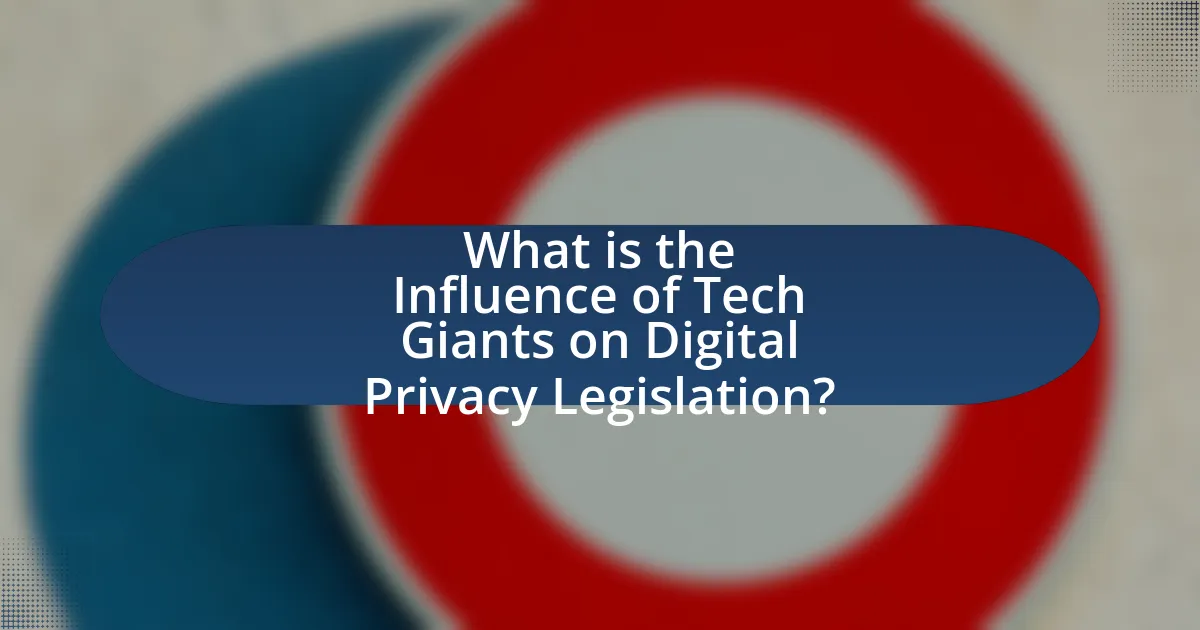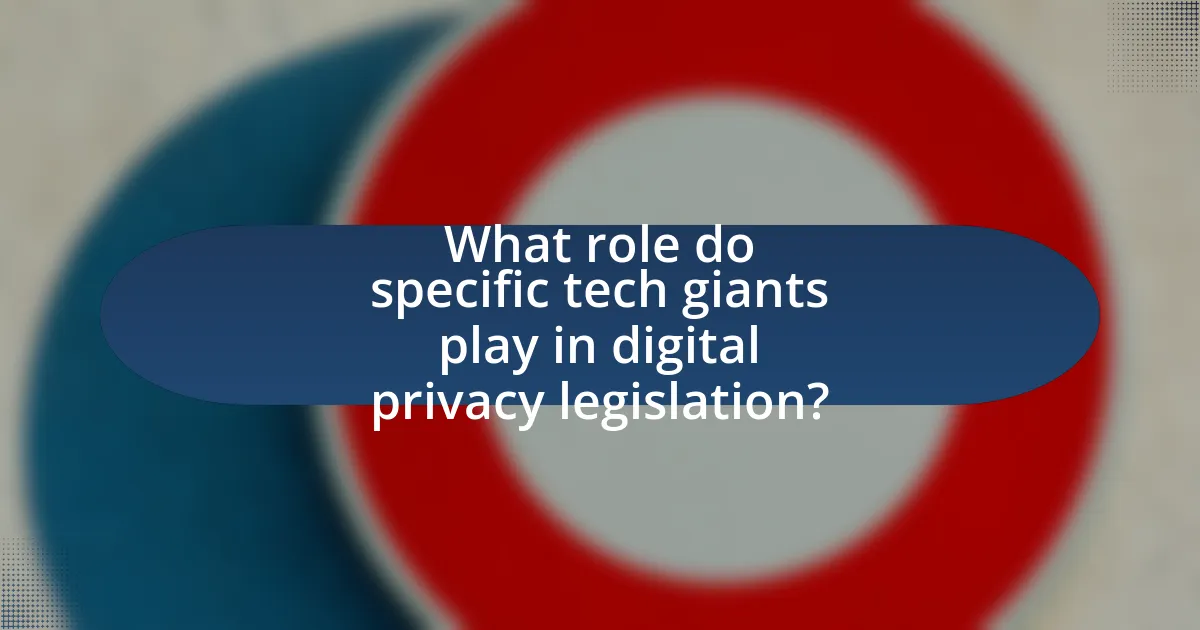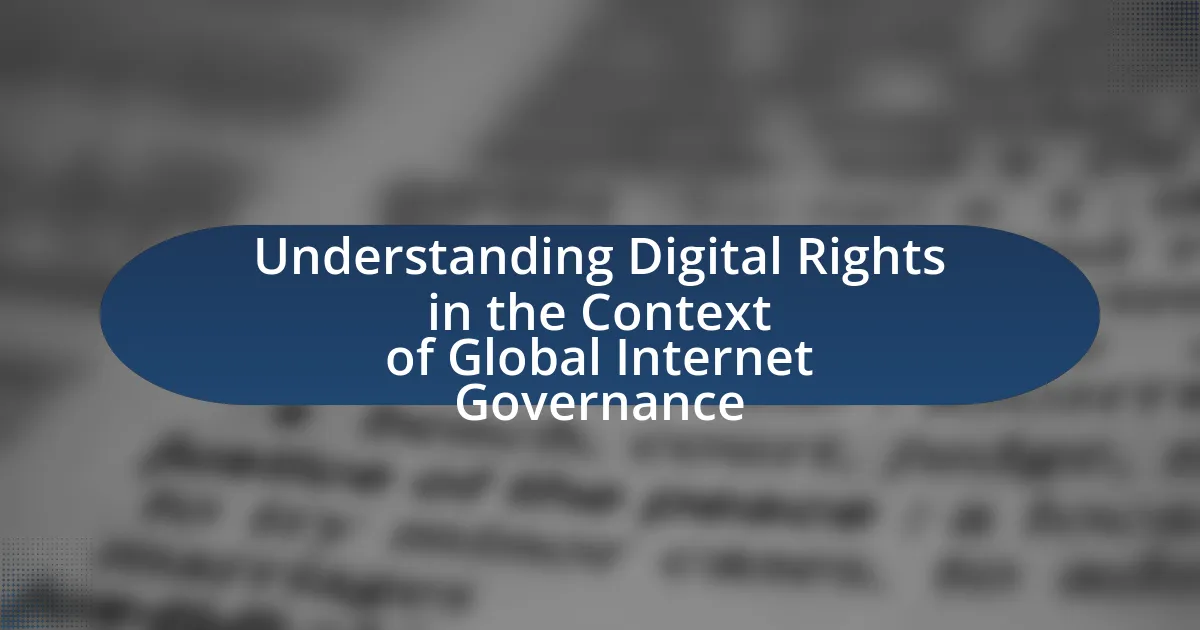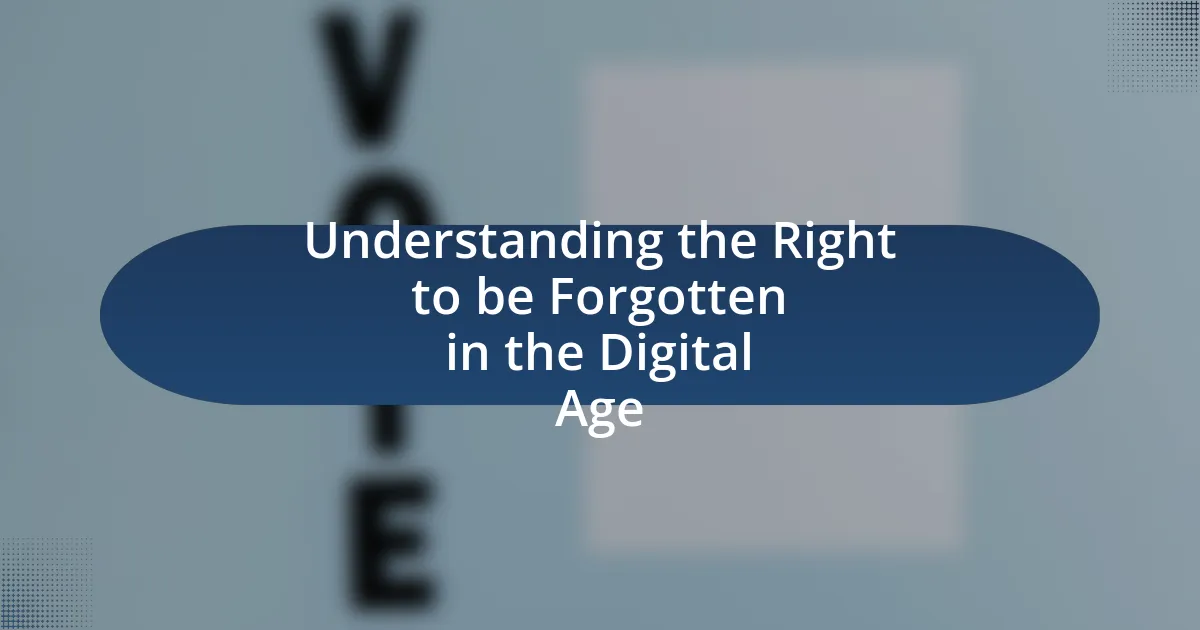The article examines the significant influence of tech giants, such as Google, Facebook, and Amazon, on digital privacy legislation. It details how these companies engage in extensive lobbying efforts, spending over $100 million annually to shape regulations that often prioritize their business interests over consumer protection. The piece highlights specific examples, including the California Consumer Privacy Act and the General Data Protection Regulation, illustrating how tech firms frame public discourse on privacy issues and advocate for self-regulatory measures. Additionally, it discusses the implications of inadequate privacy laws, the role of consumer awareness, and potential future trends in digital privacy legislation.

What is the Influence of Tech Giants on Digital Privacy Legislation?
Tech giants significantly influence digital privacy legislation by lobbying for favorable regulations and shaping public discourse. Companies like Google, Facebook, and Amazon invest heavily in lobbying efforts, spending over $100 million annually to influence lawmakers and regulatory bodies. This financial power allows them to advocate for legislation that often prioritizes their business interests, such as the promotion of self-regulatory frameworks over stricter government regulations. Additionally, these companies utilize their platforms to sway public opinion on privacy issues, often framing discussions around user consent and data protection in ways that align with their operational models. For instance, the introduction of the General Data Protection Regulation (GDPR) in Europe was partly a response to public pressure, but tech giants played a role in shaping its provisions to limit potential impacts on their business practices.
How do tech giants shape digital privacy laws?
Tech giants shape digital privacy laws by leveraging their economic power and lobbying efforts to influence legislation. These companies often engage in extensive lobbying activities, spending millions on political contributions and advocacy to sway lawmakers in favor of favorable regulations. For instance, in 2020, the Internet Association, which represents major tech firms, spent over $5 million on lobbying efforts related to privacy legislation. Additionally, tech giants frequently participate in public consultations and provide input on proposed laws, which can lead to the dilution of stricter privacy protections. Their ability to shape public discourse through marketing and media campaigns also plays a crucial role in framing privacy issues in ways that align with their business interests.
What lobbying efforts do tech companies engage in regarding privacy legislation?
Tech companies engage in extensive lobbying efforts regarding privacy legislation by funding advocacy groups, directly influencing policymakers, and participating in public consultations. For instance, major firms like Google and Facebook have invested millions in lobbying expenditures to shape legislation such as the California Consumer Privacy Act (CCPA) and the General Data Protection Regulation (GDPR) in Europe. According to the Center for Responsive Politics, in 2020 alone, the tech sector spent over $70 million on lobbying efforts in the United States, focusing on issues related to data protection and privacy regulations. These efforts often include hiring former government officials and experts to navigate the legislative landscape, thereby increasing their influence on the development of privacy laws.
How do tech giants influence public opinion on digital privacy?
Tech giants influence public opinion on digital privacy primarily through targeted marketing, lobbying efforts, and shaping narratives in media. These companies utilize extensive data analytics to tailor their messaging, promoting a narrative that emphasizes the benefits of their services while downplaying privacy concerns. For instance, Facebook and Google have invested heavily in public relations campaigns that highlight their commitment to user privacy, despite ongoing controversies regarding data breaches and surveillance practices. Additionally, lobbying efforts by these corporations have resulted in significant influence over legislative processes, as seen in the case of the California Consumer Privacy Act, where tech companies actively participated in shaping the regulations. This combination of strategic communication and political engagement effectively sways public perception, often leading to a more favorable view of their data practices.
Why is digital privacy legislation important?
Digital privacy legislation is important because it protects individuals’ personal information from misuse and exploitation by corporations and governments. Such legislation establishes legal frameworks that ensure transparency in data collection, usage, and sharing practices, thereby empowering consumers to control their own data. For instance, the General Data Protection Regulation (GDPR) implemented in the European Union has set a global standard for data protection, mandating that organizations obtain explicit consent from users before processing their data. This regulation has led to increased accountability among tech giants, compelling them to adopt more stringent data protection measures.
What are the potential risks of inadequate digital privacy laws?
Inadequate digital privacy laws pose significant risks, including increased data breaches, identity theft, and erosion of consumer trust. Without robust regulations, companies may mishandle personal data, leading to unauthorized access and exploitation. For instance, a 2020 report by the Identity Theft Resource Center indicated that data breaches exposed over 37 billion records, highlighting the vulnerability of personal information in the absence of stringent privacy protections. Furthermore, inadequate laws can enable tech giants to exploit user data without accountability, undermining individual rights and privacy. This lack of oversight can result in a monopolistic environment where consumer data is commodified, further exacerbating privacy concerns.
How do digital privacy laws protect consumers?
Digital privacy laws protect consumers by establishing regulations that govern the collection, use, and sharing of personal information by companies. These laws, such as the General Data Protection Regulation (GDPR) in Europe, require businesses to obtain explicit consent from consumers before processing their data, thereby giving individuals greater control over their personal information. Additionally, these laws mandate transparency, compelling companies to disclose how they collect and use data, which helps consumers make informed decisions. For instance, under GDPR, consumers have the right to access their data, request corrections, and demand deletion, reinforcing their autonomy and privacy rights.

What role do specific tech giants play in digital privacy legislation?
Tech giants like Google, Facebook, and Apple significantly influence digital privacy legislation through lobbying efforts, compliance strategies, and public advocacy. These companies often engage in lobbying to shape laws that govern data protection, as seen with Facebook’s involvement in the development of the California Consumer Privacy Act (CCPA), which reflects their interests in balancing user privacy with business needs. Additionally, tech giants implement privacy features in their products, such as Apple’s App Tracking Transparency, which not only complies with regulations but also sets industry standards. Their substantial financial resources enable them to impact legislative processes, as evidenced by the millions spent on lobbying in Washington, D.C., where they advocate for favorable regulations while also responding to public concerns about privacy breaches and data misuse.
How does Facebook influence digital privacy regulations?
Facebook influences digital privacy regulations primarily through its significant lobbying efforts and its role in shaping public discourse on privacy issues. The company invests heavily in lobbying, spending over $20 million annually to advocate for its interests, which directly impacts legislative outcomes. Additionally, Facebook’s data breaches and privacy scandals, such as the Cambridge Analytica incident, have prompted lawmakers to reconsider and tighten regulations, leading to the introduction of laws like the California Consumer Privacy Act (CCPA). These actions demonstrate how Facebook’s practices and responses to regulatory scrutiny can drive changes in digital privacy legislation.
What specific policies has Facebook advocated for?
Facebook has advocated for policies that promote data portability, transparency in data usage, and a balanced approach to regulation that protects user privacy while allowing for innovation. Specifically, Facebook has supported the idea of data portability, which allows users to transfer their data between services, as a means to enhance user control over personal information. Additionally, Facebook has pushed for clearer regulations that define how data can be used, emphasizing the need for transparency in data practices. The company has also called for a regulatory framework that balances user privacy with the need for technological advancement, arguing that overly stringent regulations could stifle innovation in the tech industry.
How has Facebook’s data practices impacted legislation?
Facebook’s data practices have significantly influenced legislation by prompting lawmakers to introduce stricter data privacy regulations. The Cambridge Analytica scandal in 2018, where personal data of millions of users was harvested without consent, led to increased scrutiny of Facebook’s data handling and spurred legislative efforts such as the California Consumer Privacy Act (CCPA) enacted in 2018. This act established new privacy rights for consumers and set a precedent for other states to consider similar laws, demonstrating how Facebook’s practices have catalyzed a broader movement towards enhanced digital privacy legislation.
What impact does Google have on digital privacy laws?
Google significantly influences digital privacy laws by shaping regulatory frameworks through its lobbying efforts and compliance practices. The company actively engages with policymakers to advocate for legislation that aligns with its business interests, often promoting self-regulatory measures over stringent government regulations. For instance, Google’s involvement in the development of the California Consumer Privacy Act (CCPA) illustrates its role in influencing privacy legislation, as the company provided input during the drafting process. Additionally, Google’s implementation of privacy features, such as data transparency tools, sets industry standards that can lead to broader legislative changes, as seen in the European Union’s General Data Protection Regulation (GDPR), which was partly inspired by tech companies’ practices.
What initiatives has Google launched to address privacy concerns?
Google has launched several initiatives to address privacy concerns, including the introduction of enhanced privacy controls in its products and services. For instance, Google implemented the “Privacy Sandbox” initiative, which aims to create a more private web experience by reducing reliance on third-party cookies and providing users with more control over their data. Additionally, Google has introduced features like “Incognito Mode” in Chrome and “My Activity” controls, allowing users to manage their data and browsing history more effectively. These initiatives are part of Google’s broader commitment to comply with privacy regulations such as the General Data Protection Regulation (GDPR) and the California Consumer Privacy Act (CCPA), ensuring that user data is handled transparently and securely.
How does Google’s business model affect privacy legislation?
Google’s business model, which primarily relies on data-driven advertising, significantly influences privacy legislation by creating a demand for comprehensive data collection and user profiling. This model incentivizes the collection of vast amounts of personal data to enhance targeted advertising effectiveness, leading to potential conflicts with privacy rights. For instance, the implementation of the General Data Protection Regulation (GDPR) in the European Union was partly a response to the practices of companies like Google, which highlighted the need for stricter data protection measures. Additionally, ongoing debates around privacy laws often center on balancing user consent and corporate data usage, reflecting the impact of Google’s operational strategies on legislative frameworks.
What are the implications of tech giants’ influence on digital privacy legislation?
Tech giants significantly influence digital privacy legislation by shaping policies that often prioritize their business interests over consumer protection. Their lobbying efforts can lead to legislation that lacks stringent privacy protections, as seen in the case of the California Consumer Privacy Act (CCPA), where industry input resulted in loopholes that benefit large companies. Additionally, tech giants can leverage their resources to influence public opinion and legislative agendas, which may result in weaker regulations that fail to address critical privacy concerns, ultimately undermining consumer trust and data security.
How does this influence affect consumer trust?
The influence of tech giants on digital privacy legislation significantly affects consumer trust by creating skepticism regarding data protection practices. When large technology companies lobby for favorable regulations, consumers may perceive these actions as prioritizing corporate interests over their privacy rights, leading to a decline in trust. For instance, a 2021 survey by the Pew Research Center found that 79% of Americans expressed concern about how companies use their data, indicating a direct correlation between corporate influence and consumer apprehension. This erosion of trust can result in consumers being less willing to share personal information, ultimately impacting the relationship between consumers and tech companies.
What are the consequences of eroded trust in tech companies?
Eroded trust in tech companies leads to significant consequences, including decreased user engagement and increased regulatory scrutiny. When consumers lose faith in the integrity and security of tech firms, they are less likely to share personal information or utilize their services, resulting in reduced user bases and revenue declines. For instance, a 2021 survey by Pew Research Center found that 81% of Americans feel that the potential risks of companies collecting their personal data outweigh the benefits. Additionally, diminished trust prompts governments to implement stricter regulations, as seen with the General Data Protection Regulation (GDPR) in Europe, which was enacted in response to widespread concerns about data privacy and corporate accountability. This regulatory environment can impose heavy fines and operational changes on tech companies, further impacting their business models.
How can consumer awareness impact tech giants’ practices?
Consumer awareness can significantly impact tech giants’ practices by driving them to adopt more transparent and ethical policies. When consumers are informed about data privacy issues, they tend to demand better protection and accountability from companies. For instance, the Cambridge Analytica scandal in 2018 led to heightened consumer scrutiny and resulted in tech giants like Facebook implementing stricter data privacy measures and enhancing user consent protocols. This shift illustrates how consumer pressure can compel companies to prioritize user privacy and adapt their business models to align with public expectations.
What are the potential future trends in digital privacy legislation?
Potential future trends in digital privacy legislation include increased regulatory scrutiny, the adoption of comprehensive data protection laws, and the implementation of stricter consent requirements. Regulatory bodies are likely to enhance oversight as public awareness of privacy issues grows, evidenced by the introduction of laws like the General Data Protection Regulation (GDPR) in Europe, which has set a precedent for similar legislation globally. Additionally, tech giants are influencing these trends by advocating for standardized regulations that could simplify compliance across jurisdictions, as seen in their lobbying efforts for frameworks like the California Consumer Privacy Act (CCPA). Furthermore, the rise of artificial intelligence and data analytics will prompt lawmakers to address emerging privacy concerns, leading to more nuanced legislation that balances innovation with consumer protection.
How might tech giants adapt to changing privacy laws?
Tech giants might adapt to changing privacy laws by implementing more robust data protection measures and enhancing user consent protocols. For instance, companies like Google and Facebook have already begun to revise their privacy policies in response to regulations such as the General Data Protection Regulation (GDPR) in Europe, which mandates stricter data handling practices. These adaptations often include investing in advanced encryption technologies, conducting regular privacy audits, and providing clearer user interfaces for consent management. Additionally, tech giants may engage in lobbying efforts to influence future legislation, ensuring that their business models remain viable while complying with new legal standards.
What role will emerging technologies play in shaping privacy legislation?
Emerging technologies will significantly influence privacy legislation by necessitating new frameworks that address data collection, usage, and protection. As technologies like artificial intelligence, blockchain, and the Internet of Things evolve, they create complex data ecosystems that challenge existing privacy laws. For instance, the General Data Protection Regulation (GDPR) in Europe was partly a response to the rise of big data analytics, highlighting the need for regulations that can adapt to technological advancements. Additionally, the rapid development of privacy-enhancing technologies, such as encryption and anonymization tools, will push lawmakers to consider how these innovations can be integrated into legal standards to better protect consumer privacy while fostering technological growth.
What can consumers do to protect their digital privacy?
Consumers can protect their digital privacy by using strong, unique passwords for each online account and enabling two-factor authentication whenever possible. Strong passwords reduce the risk of unauthorized access, while two-factor authentication adds an extra layer of security by requiring a second form of verification. According to a 2021 study by the Cybersecurity & Infrastructure Security Agency, accounts with two-factor authentication are 99.9% less likely to be compromised. Additionally, consumers should regularly review privacy settings on social media and other online platforms to limit data sharing. By being proactive in managing their online presence, consumers can significantly enhance their digital privacy.
What best practices should individuals follow to safeguard their privacy online?
Individuals should use strong, unique passwords and enable two-factor authentication to safeguard their privacy online. Strong passwords reduce the risk of unauthorized access, while two-factor authentication adds an extra layer of security by requiring a second form of verification. According to a 2021 report by the Cybersecurity & Infrastructure Security Agency, using multi-factor authentication can block 99.9% of automated attacks. Additionally, individuals should regularly review privacy settings on social media and other online accounts to limit data sharing. Research from the Pew Research Center indicates that 81% of Americans feel they have little to no control over the data collected about them online, highlighting the importance of proactive privacy management. Lastly, individuals should be cautious about sharing personal information and avoid using public Wi-Fi for sensitive transactions, as unsecured networks can expose data to cyber threats.
How can consumers advocate for stronger privacy protections?
Consumers can advocate for stronger privacy protections by actively participating in public discourse, supporting privacy-focused legislation, and engaging with organizations that promote digital rights. By voicing concerns through social media, petitions, and public comments during legislative hearings, consumers can influence policymakers. Supporting organizations like the Electronic Frontier Foundation or the American Civil Liberties Union, which work to protect digital privacy, amplifies their impact. Additionally, consumers can educate themselves and others about privacy issues, fostering a more informed public that demands accountability from tech giants. This collective action is crucial, as studies show that public pressure can lead to significant changes in legislation and corporate practices regarding privacy.





